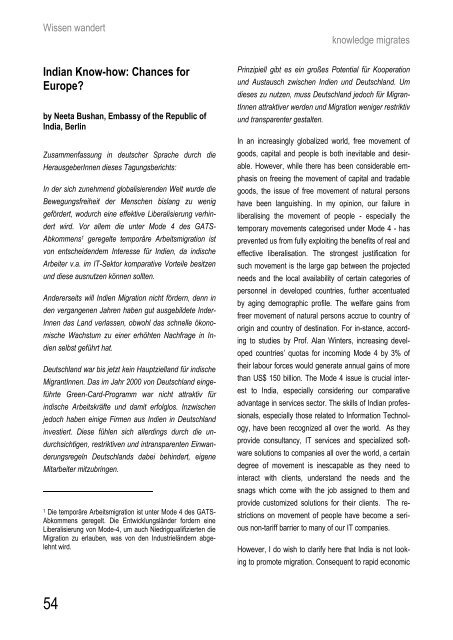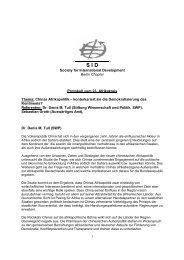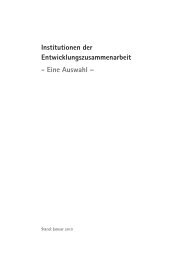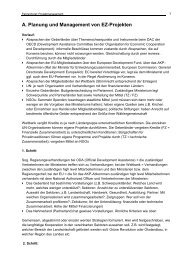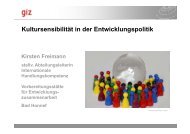Konferenzbericht (PDF-Dokument, 3 MB) - SID
Konferenzbericht (PDF-Dokument, 3 MB) - SID
Konferenzbericht (PDF-Dokument, 3 MB) - SID
Sie wollen auch ein ePaper? Erhöhen Sie die Reichweite Ihrer Titel.
YUMPU macht aus Druck-PDFs automatisch weboptimierte ePaper, die Google liebt.
Wissen wandert<br />
Indian Know-how: Chances for<br />
Europe?<br />
by Neeta Bushan, Embassy of the Republic of<br />
India, Berlin<br />
Zusammenfassung in deutscher Sprache durch die<br />
HerausgeberInnen dieses Tagungsberichts:<br />
In der sich zunehmend globalisierenden Welt wurde die<br />
Bewegungsfreiheit der Menschen bislang zu wenig<br />
gefördert, wodurch eine effektive Liberalisierung verhin-<br />
dert wird. Vor allem die unter Mode 4 des GATS-<br />
Abkommens 1 geregelte temporäre Arbeitsmigration ist<br />
von entscheidendem Interesse für Indien, da indische<br />
Arbeiter v.a. im IT-Sektor komparative Vorteile besitzen<br />
und diese ausnutzen können sollten.<br />
Andererseits will Indien Migration nicht fördern, denn in<br />
den vergangenen Jahren haben gut ausgebildete Inder-<br />
Innen das Land verlassen, obwohl das schnelle ökono-<br />
mische Wachstum zu einer erhöhten Nachfrage in In-<br />
dien selbst geführt hat.<br />
Deutschland war bis jetzt kein Hauptzielland für indische<br />
MigrantInnen. Das im Jahr 2000 von Deutschland einge-<br />
führte Green-Card-Programm war nicht attraktiv für<br />
indische Arbeitskräfte und damit erfolglos. Inzwischen<br />
jedoch haben einige Firmen aus Indien in Deutschland<br />
investiert. Diese fühlen sich allerdings durch die un-<br />
durchsichtigen, restriktiven und intransparenten Einwan-<br />
derungsregeln Deutschlands dabei behindert, eigene<br />
Mitarbeiter mitzubringen.<br />
1 Die temporäre Arbeitsmigration ist unter Mode 4 des GATS-<br />
Abkommens geregelt. Die Entwicklungsländer fordern eine<br />
Liberalisierung von Mode-4, um auch Niedrigqualifizierten die<br />
Migration zu erlauben, was von den Industrieländern abgelehnt<br />
wird.<br />
54<br />
knowledge migrates<br />
Prinzipiell gibt es ein großes Potential für Kooperation<br />
und Austausch zwischen Indien und Deutschland. Um<br />
dieses zu nutzen, muss Deutschland jedoch für Migran-<br />
tInnen attraktiver werden und Migration weniger restriktiv<br />
und transparenter gestalten.<br />
In an increasingly globalized world, free movement of<br />
goods, capital and people is both inevitable and desir-<br />
able. However, while there has been considerable em-<br />
phasis on freeing the movement of capital and tradable<br />
goods, the issue of free movement of natural persons<br />
have been languishing. In my opinion, our failure in<br />
liberalising the movement of people - especially the<br />
temporary movements categorised under Mode 4 - has<br />
prevented us from fully exploiting the benefits of real and<br />
effective liberalisation. The strongest justification for<br />
such movement is the large gap between the projected<br />
needs and the local availability of certain categories of<br />
personnel in developed countries, further accentuated<br />
by aging demographic profile. The welfare gains from<br />
freer movement of natural persons accrue to country of<br />
origin and country of destination. For in-stance, accord-<br />
ing to studies by Prof. Alan Winters, increasing devel-<br />
oped countries‟ quotas for incoming Mode 4 by 3% of<br />
their labour forces would generate annual gains of more<br />
than US$ 150 billion. The Mode 4 issue is crucial inter-<br />
est to India, especially considering our comparative<br />
advantage in services sector. The skills of Indian profes-<br />
sionals, especially those related to Information Technol-<br />
ogy, have been recognized all over the world. As they<br />
provide consultancy, IT services and specialized soft-<br />
ware solutions to companies all over the world, a certain<br />
degree of movement is inescapable as they need to<br />
interact with clients, understand the needs and the<br />
snags which come with the job assigned to them and<br />
provide customized solutions for their clients. The re-<br />
strictions on movement of people have become a seri-<br />
ous non-tariff barrier to many of our IT companies.<br />
However, I do wish to clarify here that India is not look-<br />
ing to promote migration. Consequent to rapid economic


